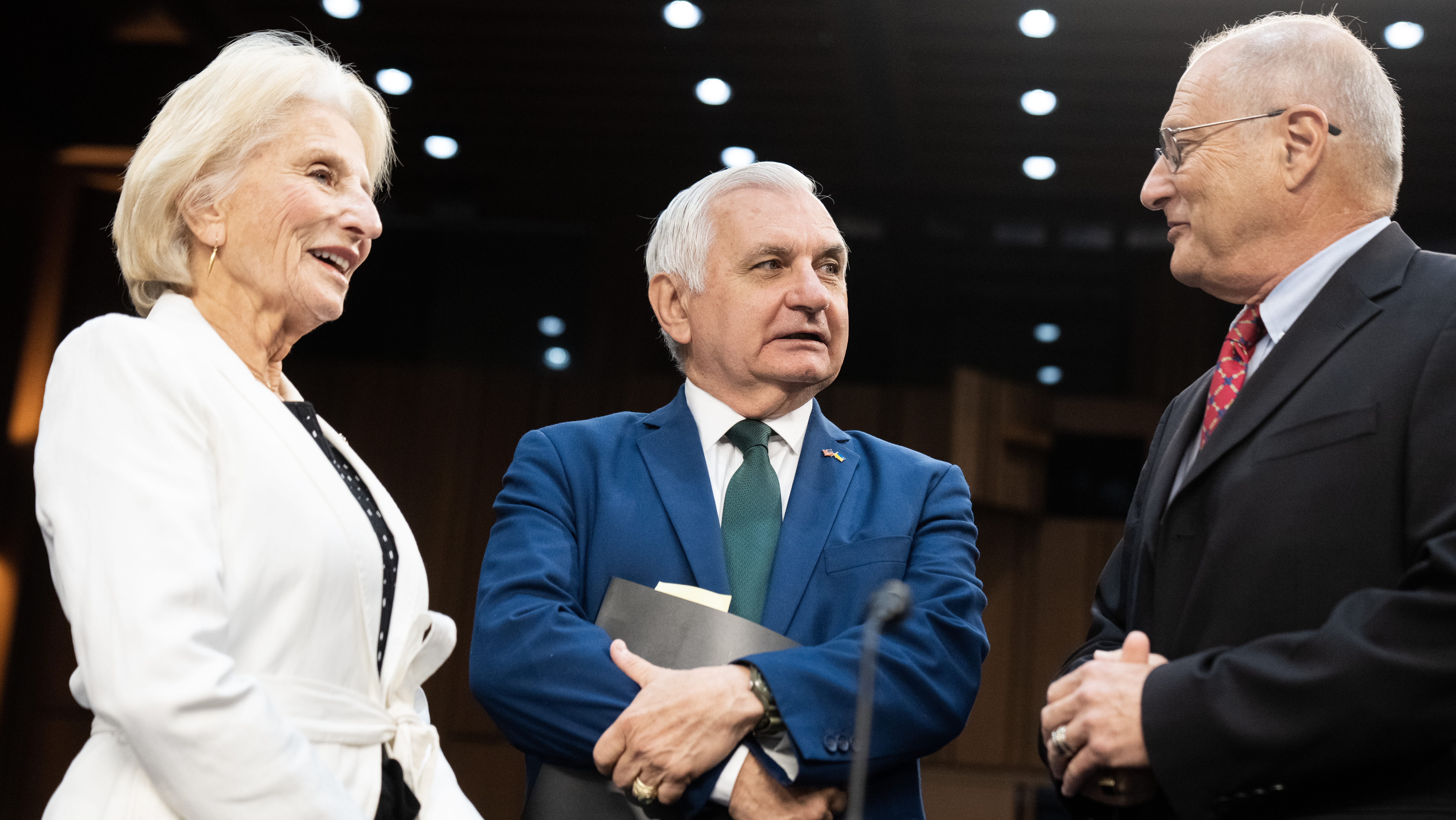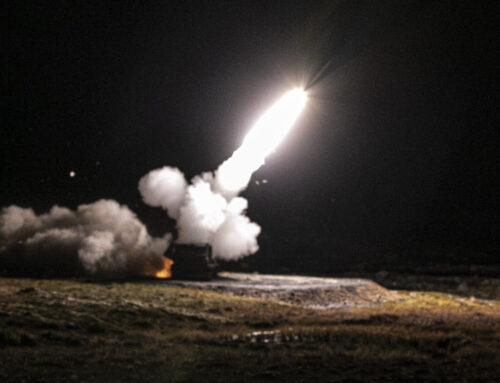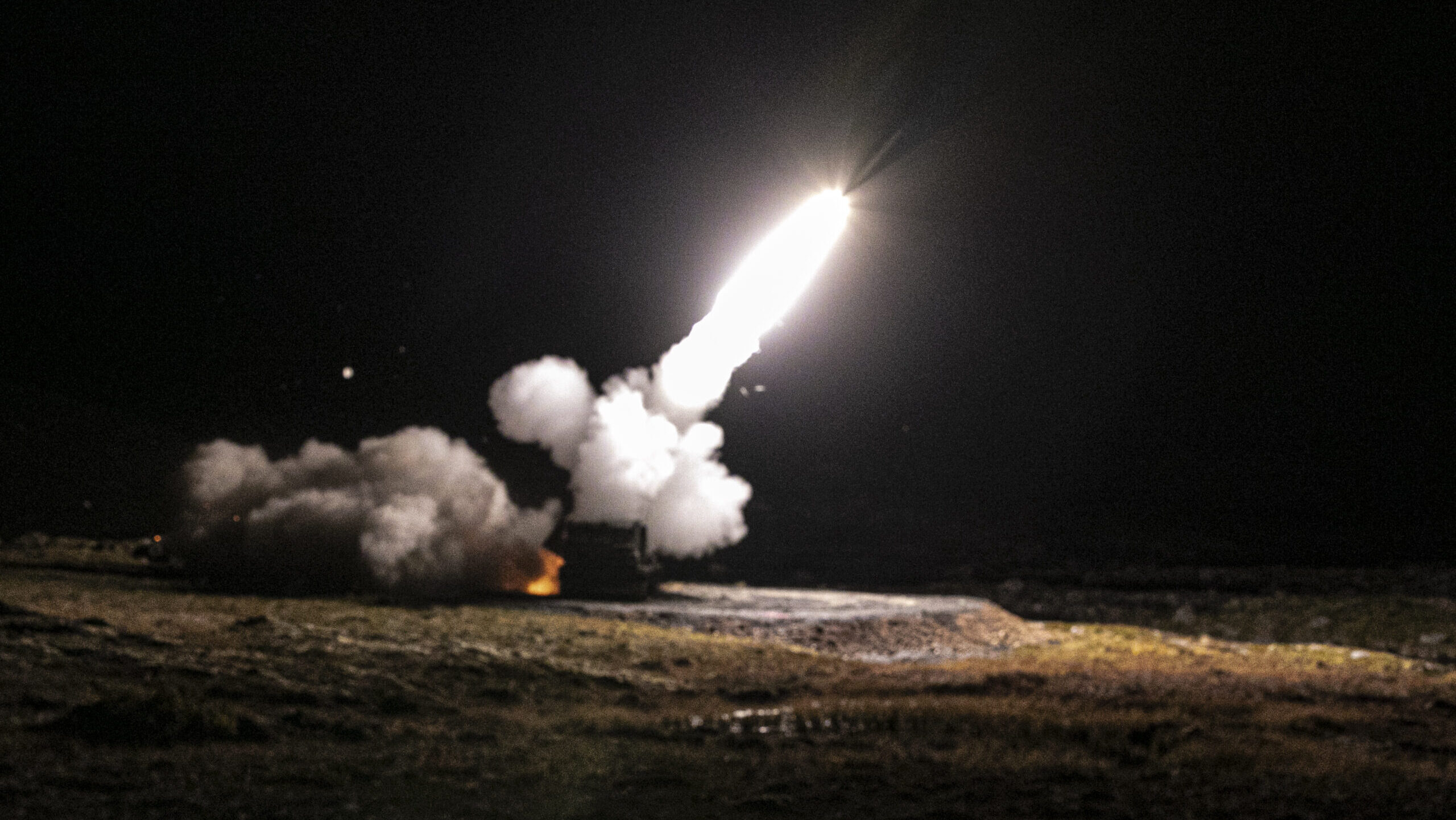Chairman Jack Reed, D-R.I., center, greets former Rep. Jane Harman, D-Calif., chair of the Commission on the National Defense Strategy, and vice chair Eric S. Edelman, before the Senate Armed Services Committee hearing on the “findings and recommendations of the Commission on the National Defense Strategy,” in Dirksen Building on Tuesday, July 30, 2024. (Tom Williams/CQ-Roll Call, Inc via Getty Images)
In its final report, released at the end of last month, the Commission on the National Defense Strategy (NDS) had a chance to tackle the Pentagon’s most stubborn but pressing challenge: the failure to prioritize. It squandered this opportunity, however, by recommending a “multi-theater force construct” that requires a larger military, more spending and an increased forward presence in Asia, Europe and the Middle East while still defending the homeland. In other words, the Commission’s more-of-everything prescription punted on arguably the most crucial question it was supposed to tackle.
Even as the defense budget pushes towards $1 trillion, the status quo approach leaves the United States overstretched — involved in unnecessary wars where its interests are limited, and falling behind in Asia, where the stakes are highest. The Commission’s answer to this perennial overcommitment is to double down, with the American public footing the bill through tax increases and entitlement cuts. As attention shifts to what the US defense strategy might look like under a new president, policymakers should not repeat the Commission’s mistake, and instead must lean into the hard but necessary prioritization choices required to align ambitions and resources.
We are currently witnessing the consequences of the US failure to set and stick to national security priorities and its efforts to retain global military primacy. Although the Biden administration defined China as the “pacing threat” and Asia as the most important theater for US interests, it has found itself sucked deeper into the Middle East and Europe, where Washington has large numbers of forces and extensive security commitments, at the expense of its investments in the Indo-Pacific. In Asia, meanwhile, China is taking advantage of a distracted United States, continuing to expand its naval fleet and missile stockpiles, while ramping up gray zone activities in the South China Sea.
The Commission’s multi-theater approach worsens these problems. Even with bigger budgets, trying to meet the demands of homeland defense and global military leadership in three theaters will spread US munitions, military forces, and advanced systems thin for the foreseeable future, leaving the United States underprepared for missions abroad, vulnerable at home, and at risk of defeat in Asia, where it matters most. Efforts to assert US military dominance could fail in other ways as well, including triggering new arms races or alienating countries that are less willing to yield to US preeminence now that they have other options.
The Commission explicitly rejects making the type of prioritization decisions that would be required to make US strategy solvent, arguing that “the United States must engage globally … to maintain stability and preserve influence worldwide” and that its presence is simply too important everywhere to pull back from any one theater. Instead, it insists that more resources — money and personnel to fill spots in the larger armed forces — will be required and looks to the American public to provide both. Even if the defense budget continues to rise, it won’t realistically cover the cost of Commission’s proposals, leaving the recommended strategy as insolvent as it is imprudent.
The Commission report does deserve points for candor. It admits that with the national debt itself a security risk, large increases in defense spending — the Commission suggests the military budget should grow by hundreds of billions of dollars in coming years — would need to be accompanied by unspecified “additional taxes and reforms to entitlement spending.” But let’s be real: The unpopularity of tax increases and cuts to Medicare and Social Security mean Congress will likely thumb its nose at these ideas, leaving only a few, small pots of money to be redirected towards defense — nothing close to what the Commission feels the Pentagon needs.
The Commission is also unlikely to win the public support it says is needed to underwrite its vision. The Commission calls on policymakers to “make the case publicly why these challenges matter and why the United States remains the indispensable nation to maintain peace, stability, and a flourishing economy.”
But Americans aren’t likely to fall for this narrative again. Decades of massive overseas military commitments and failed military adventures in the Middle East have not brought peace and prosperity to that region, nor have they left Americans better off. Instead, as the Commission argues, the risk of major power war is more likely than any other time this century. It is unsurprising, then, that US voters are increasingly ambivalent or opposed to the United States playing a large role abroad, resistant to paying for defense budget increases, and uninterested in military service — propensity to serve sat at just 9 percent among eligible young people in 2023.
The authors of the next NDS should abandon the quest for global military preeminence once and for all and ruthlessly prioritize, placing the focus on US investments and posture in Asia and at home — committing to finally executing the promised “Asia pivot.” This will mean downsizing ground forces and reducing forward presence in Europe and the Middle East rather than increasing it; ending legacy and underperforming acquisition programs; choosing lower cost strategies rather than depending on expensive, exquisite systems; and accepting a reduced, though still important, global role for the United States that reflects its geographic and latent power advantages.
These cuts will be painful, but ultimately, the United States will be more secure if it does less.
Jennifer Kavanagh is a senior fellow and the Director of Military Analysis at Defense Priorities, a think tank in Washington D.C. She is also an adjunct professor at Georgetown University.











